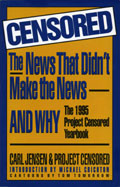
| Home News Releases | Contact |
Sources Bookshelf

Censored: The News That Didn't Make The News - And Why
The 1995 Project Censored Yearbook
Jensen, Carl, and Project Censored. Introduction by Michael Crichton. Cartoons by Tom Tomorrow.
Publisher: Four Walls Eight Windows, New York, USAYear Published: 1996
Pages: 332pp Price: $20.95
Please see our media profile in Sources:
Sources Select Resources
At the heart of Project Censored lies a conviction that the U.S. mass media does shabby service to the citizenry, deliberately or negligently withholding information of vital importance. For the purposes of the Project, censorship was defined as "the suppression of information, whether purposeful or not, by any method - including bias, omission, under-reporting, or self-censorship - which prevents the public from fully knowing what is happening in the world."
Each year, Project Censored produces reports citing what are considered the top 10 underpublished stories of the previous year, as Jensen says in the current report "the stories that many Americans have not seen or hear about - but should have."
The main aim, says Jensen, is to stimulate journalists, editors, producers and publishers to support more muckraking investigative journalism, to act as the "irritating grain of sand" that makes oysters produce pearls.
Why do the media fail to cover critical issues consistently and comprehensively? Jensen argues it's not a conspiracy on the part of the media elite, though noting that currently fewer than 20 corporations control most of the mass media.
"Nonetheless, the bottom line explanation for much of the censorship that occurs in the mainstream media is the media's own bottom line. Corporate media executives perceive their primary, and often sole responsibility to be the need to maximize profits, not, as some would have it, inform the public. Many of the stories cited by Project Censored are not in the best financial interests of publishers, owner, stockholders, or advertisers.
Equally important, investigative journalism is more expensive than the 'public stenography' school of journalism. And, of course, there is always the 'don't rock the boat' mentality which pervades corporate media boardrooms and filters on down to the newsroom."
Subject Headings
- AIDS (Acquired Immune Deficiency Syndrome)
- Censorship
- Censorship/de facto
- Chlorofluorocarbons (CFCs)
- Environmental Reporting
- Federal Bureau of Investigation (FBI)
- Fisheries Industry
- Food & Drug Regulations
- Freedom of the Press
- Journalism
- Media
- Media Analysis & Criticism
- Media Bias
- Media Coverage
- News
- News Coverage
- Newspapers
- Nuclear Standards & Regulation
- Ozone Depletion
- Pesticides
- Radiation
- Scandals
- Television
- Toxic Substances
- United States of America
- Vietnam War
© Sources 2026. The information provided is copyright and may not be reproduced in any form or by any means (whether electronic, mechanical or photographic), or stored in an electronic retrieval system, without written permission of the publisher.